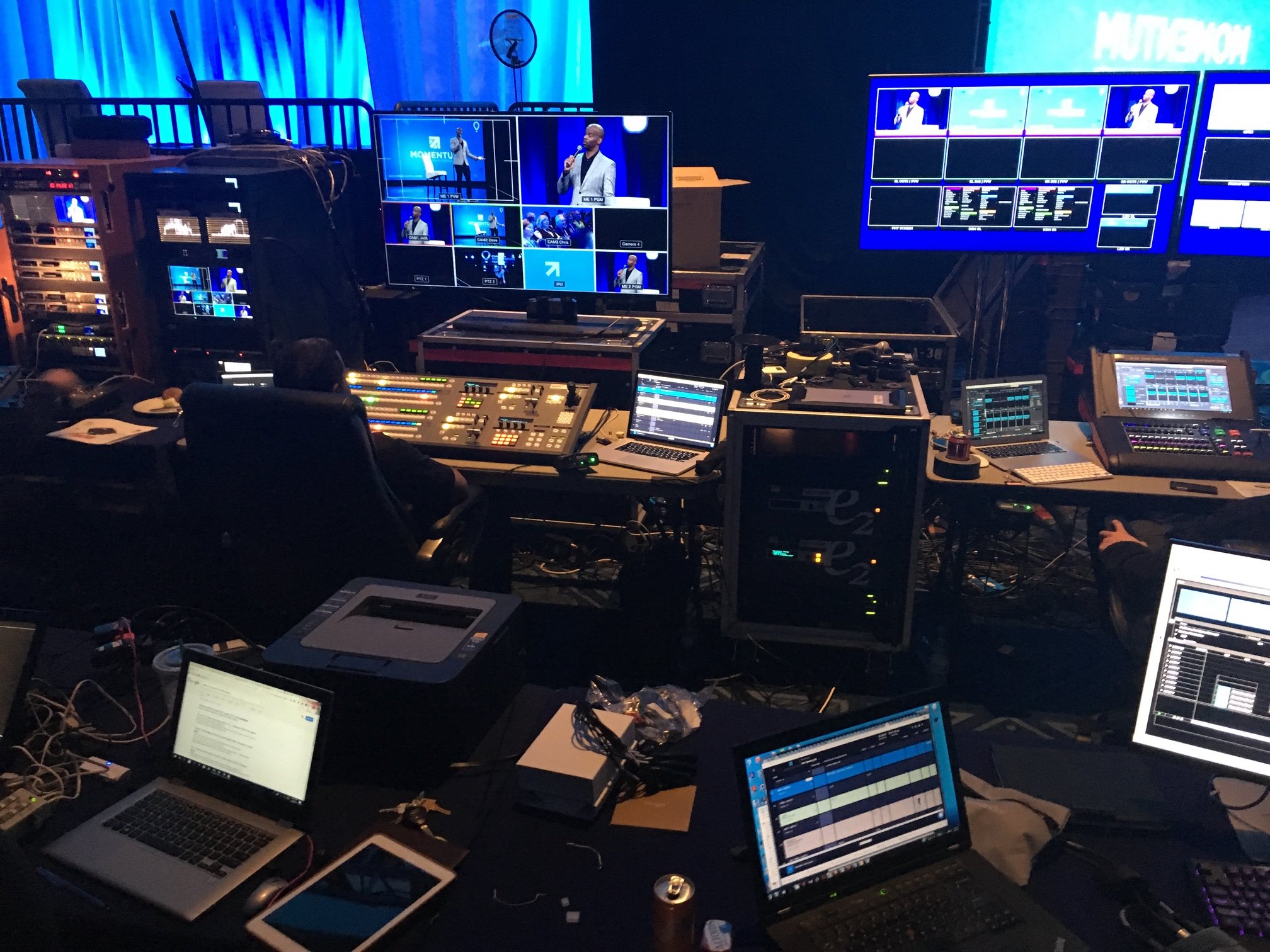Exactly How Event Production Works: A Comprehensive Look at the Process
Event production is a complex and structured procedure that calls for cautious preparation and implementation. It starts with establishing clear objectives and understanding the target audience. Each step, from budgeting to place selection, plays a vital function in guaranteeing success. As the process unfolds, numerous aspects need to align perfectly. Yet, the nuances of this intricate procedure commonly go unnoticed. What are the key phases that add to a memorable event?

The Preliminary Drawing Board
When beginning on event production, mindful preparation is necessary to assure an effective end result. The first drawing board works as the foundation for all subsequent efforts. Throughout this stage, event manufacturers have to specify the event's objective and purposes plainly. Recognizing the target market aids customize the experience and messaging, ensuring importance and engagement.Producers need to additionally take into consideration the event layout, whether it be in-person, online, or hybrid, as this will certainly affect different logistical elements. Choosing a suitable date and venue is essential, as it impacts ease of access and availability.Furthermore, constructing a reputable group is fundamental for dividing responsibilities and streamlining communication. Developing a timeline with turning points assurances all tasks are finished on timetable. This phase includes extensive research, consisting of recognizing prospective challenges and devising strategies to mitigate threats. Eventually, a well-structured initial preparation phase sets the tone for an effective event production journey.

Budgeting and Source Allocation
In event production, reliable budgeting and resource appropriation are important for success - event production charlotte. Establishing economic parameters establishes the foundation for all succeeding decisions, while source distribution methods guarantee that every part of the event is sufficiently sustained. Together, these components assist keep control over expenditures and maximize making use of readily available resources
Establishing Financial Parameters
Developing financial specifications is vital to the success of any type of event production, as it establishes the foundation for efficient budgeting and source allocation. This process starts with specifying the overall budget, which encompasses all elements of the event, consisting of venue costs, wedding catering, and marketing. By determining readily available funds, event planners can prioritize expenditures and designate sources accordingly. In addition, it is necessary to conduct comprehensive market research study to prepare for potential costs and identify funding sources, such as sponsorships or ticket sales. Developing clear monetary criteria additionally help in risk management, allowing coordinators to reserve contingency funds for unforeseen costs. Inevitably, a distinct spending plan functions as a roadmap, guiding the event production team towards achieving their goals while maintaining financial control.
Resource Circulation Strategies
Effective source circulation approaches are crucial for optimizing the effect of an occasion while adhering to budget constraints. Successful event production calls for a thorough strategy to budgeting and source appropriation. Coordinators must focus on vital components such as place, wedding catering, and technology, ensuring that funds are assigned to areas that enhance attendee experience. A comprehensive spending plan ought to detail expected costs and recognize locations for prospective price financial savings, such as working out with vendors or discovering sponsorship possibilities. In addition, tracking expenses throughout the preparation procedure aids avoid overspending. By using tactical resource circulation, event manufacturers can provide an unforgettable experience while preserving monetary duty, eventually adding to the total success of the event.
Venue Option and Logistics
Selecting the appropriate location is important to the success of any kind of event, as it sets the phase for the overall experience. Location option includes reviewing various variables, including capability, accessibility, and place. Planners should take into consideration the target audience and the nature of the event, making certain the venue lines up with the event's goals.Logistics play a considerable role in this process, including setups for seats, audiovisual equipment, and catering solutions. An appropriate venue ought to promote smooth circulation for attendees and personnel, boosting engagement.Additionally, assessing potential locations for features like parking, washrooms, and fire escape is very important for safety and comfort. The timeline for safeguarding the location is likewise essential, as popular locations may reserve rapidly - event production charlotte. Comprehensive planning and timely execution can ultimately contribute to a seamless event experience, making place option and logistics basic parts of effective event production.
Creative Principle Development
While the place establishes the physical phase, innovative principle advancement shapes the event's identity and narrative. This procedure begins with recognizing the event's function and target audience, enabling event producers to formulate a compelling motif that reverberates with guests. Brainstorming sessions typically include diverse viewpoints, cultivating ingenious ideas that align with the event's goals.Once a motif is established, visual elements such as shade combinations, signage, and style are created to enhance the total ambience. Storytelling strategies might also be incorporated to produce an engaging trip for participants, guaranteeing a remarkable experience. Furthermore, considerations pertaining to enjoyment, activities, and interactive parts are lined up with the picked idea, reinforcing the style throughout the event.Ultimately, effective imaginative concept growth warranties that every element of the event functions cohesively, leaving an enduring impression on guests and fulfilling the event's goals. This foundational work prepares for subsequent preparation and execution phases.
Collaborating With Suppliers and Distributors
Successful event production depends upon effective partnership with suppliers and providers. Picking reputable companions, working out agreements properly, and guaranteeing prompt deliveries are vital actions in this process. Each of these aspects adds significantly to the general success and smooth implementation of an event.
Selecting Reliable Partners
Just how can event organizers guarantee a seamless production experience? Choosing reliable partners is vital in attaining this objective. Event planners should carry out detailed research to identify vendors and providers with a tested record of quality. This consists of examining references, reviewing portfolios, and assessing client comments. Coordinators must focus on companions that show professionalism, timely communication, and a determination to collaborate. Building strong relationships fosters trust and enables fast analytic throughout the event. Furthermore, it is helpful to select regional vendors who understand their explanation the venue and local logistics. Inevitably, an effective event depends upon the synergy between organizers and their companions, making sure that every element of production runs smoothly and successfully.
Bargaining Agreements Efficiently
Reliable arrangement of agreements is a crucial step in the collaboration in between event coordinators and their vendors and distributors. This procedure includes clear communication of assumptions, deliverables, and timelines. Coordinators should perform complete research on market prices and market standards to develop a baseline for arrangements. It is necessary to create a joint environment, encouraging open discussion about terms, rates, and prospective contingencies. Coordinators should additionally prioritize recognizing the vendor's capacities and restrictions to straighten their requirements effectively. Adaptability can lead to equally advantageous arrangements, fostering lasting relationships. Crafting distinct contracts that include details performance metrics can aid ensure liability, eventually bring about successful event implementation and fulfillment for all parties included.
Making Certain Timely Shipments
Prompt deliveries are necessary for the smooth execution of any event, needing diligent partnership in between organizers and their vendors and providers. Reliable communication is important, as it aids develop clear expectations pertaining to delivery routines, amounts, and details requirements. Coordinators usually create comprehensive timelines to detail essential milestones, guaranteeing all celebrations remain aligned throughout the process. Routine check-ins with vendors can assist determine prospective hold-ups early, permitting positive options. In addition, constructing solid partnerships with trusted suppliers cultivates trust and liability, which can cause far better solution and prioritization. By focusing on these collective efforts, planners can minimize disruptions, thereby boosting the total effectiveness of event production and making sure that all required materials and services get here as intended.
Advertising and Promotion Strategies
While arranging an event, the success of advertising and marketing and promotion strategies can substantially influence attendance and interaction. Effective approaches commonly include a mix of digital advertising and marketing, standard advertising, and grassroots outreach. Making use of social media systems enables real-time communication and targeted advertising, getting to specific demographics successfully. Email marketing projects can further involve potential guests with personalized web content and reminders.Collaborations with influencers or industry leaders can also enhance reliability and broaden reach. Creating engaging content, such as video clips or i was reading this blogs, assists to generate buzz and endure passion leading up to the event. Additionally, leveraging early-bird discount rates and unique benefits can incentivize ticket purchases.Promoting with typical channels, such as posters or regional media, continues to be pertinent, especially in community-focused events. A detailed approach that integrates several methods warranties maximum visibility and interaction, eventually adding to the event's success and the production of a remarkable experience for attendees.
On-Site Execution and Management
On-site execution and administration are crucial components that determine the overall success of an occasion. Reliable control throughout the event assures that all components straighten with the intended schedule. Event supervisors look after logistics, consisting of supplier control, tools arrangement, and visitor solutions. Checking timelines and addressing any kind of unanticipated concerns are basic for preserving a seamless experience.The personnel plays a considerable role, as trained personnel are accountable click for more info for numerous jobs such as enrollment, info dissemination, and technical assistance. Interaction among employee is important; it fosters a collaborative setting and makes it possible for quick resolution of challenges.Additionally, safety methods have to be stuck to, protecting the well-being of all attendees. Post-event analyses are likewise part of on-site monitoring, supplying insights for future enhancements. By concentrating on these elements, event manufacturers can produce memorable experiences that fulfill or surpass attendee assumptions while achieving the event's purposes.
Often Asked Questions
Exactly how Do I Choose the Right Event Motif?
Choosing the appropriate event style entails thinking about the target audience, event function, and venue. Investigating current patterns and gathering input from stakeholders can likewise inspire innovative concepts that resonate and develop a memorable experience.

What Are Common Mistakes in Event Production?
Usual blunders in event production usually consist of insufficient planning, poor interaction amongst staff member, spending plan mismanagement, disregarding to take right into account the audience's needs, and failing to perform a detailed post-event examination for future enhancements.
How Can I Gauge Event Success?
To determine event success, one can evaluate attendee contentment, involvement levels, budget adherence, and post-event responses. Key efficiency signs, such as ticket sales and social media communications, likewise provide beneficial insights right into general effectiveness.
What Should I Do if It Drizzles on the Event Day?
In case of moisten the day, the coordinator needs to apply backup strategies, such as safeguarding camping tents or moving activities inside. Communication with guests about adjustments is vital to guarantee a smooth experience in spite of weather difficulties.
How Can I Make Sure Participant Interaction Throughout the Event?
